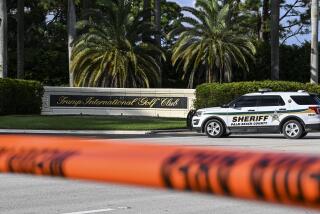Pakistani leader Musharraf survives attack on aircraft
- Share via
ISLAMABAD, PAKISTAN — President Pervez Musharraf survived an apparent assassination attempt Friday when shots were fired at his aircraft as it took off from a military base, authorities and witnesses said.
It was not immediately clear whether there was any connection between the shooting incident and the ongoing siege by Pakistani troops of a radical mosque here in the capital. At least 19 people are reported to have died in the mosque confrontation, which began Tuesday.
A sense of crisis has gripped Pakistan over the last four months as a burgeoning movement for democracy has challenged Musharraf’s attempts to sideline the chief justice of the Supreme Court, who might have posed an obstacle to the president’s efforts to secure another term. The army general seized power eight years ago in a bloodless coup.
Despite the turmoil, the Bush administration has stood by Musharraf, considered a key ally in the fight against the Taliban and other Islamic militants in Pakistan and across the border in Afghanistan. Most American policymakers believe that toppling the general could create a dangerous power vacuum in the nuclear-armed state, home to many militant groups.
Musharraf’s aircraft came under fire as it took off from the Chaklala air base in Rawalpindi, a garrison city adjoining the capital. Police said two antiaircraft guns and a light machine gun were seized from a house directly beneath the flight paths of the base and of Islamabad’s international airport.
Security officials in Rawalpindi said 25 rounds from a light machine gun had apparently been fired toward the aircraft. A neighbor, Imran Sheikh, said the house searched was rented by a family, but that he knew little about them.
The president’s plane landed without incident in the town of Turbat, in southern Pakistan, an area hit hard by flooding last month.
Musharraf has escaped at least three confirmed assassination bids, all believed to have been masterminded by Islamic militants. Two of the attempts, in the form of bombs aimed at his convoy, took place 11 days apart, in December 2003.
The Associated Press cited a senior security official who blamed Friday’s incident on “miscreants,” generally a code word for Islamic militants.
In Pakistan’s restive border region, attacks against government officials and security forces have become an almost daily occurrence. On Friday, police reported that a bicycle bomber had struck a military convoy in North-West Frontier Province, killing four soldiers.
In the capital, paramilitary and army troops backed by armored vehicles and helicopters maintained a tight cordon around the Lal Masjid, or Red Mosque, where dozens of militants are believed to be holed up.
More than 1,200 people, many of them teenage students, both male and female, at Islamic seminaries inside the complex, have surrendered to authorities since fighting with security forces erupted Tuesday.
The mosque’s senior clerics, two brothers, had for the last six months posed an open challenge to Musharraf’s government, denouncing his alliance with the United States and demanding the imposition of Sharia, or Islamic law, in Pakistan.
The chief cleric, Maulana Abdul Aziz, was seized Wednesday as he tried to flee in a women’s veil. His brother, Abdul Rashid Ghazi, told a private television station Friday that those holed up in the mosque would not surrender to authorities. Officials have cut off the mosque’s electricity and water.
The Pakistani government has demanded an unconditional surrender by those inside the mosque compound. Troops and police for a second day set explosives charges next to the wall of the complex, but did not attempt to storm the cluster of buildings.
Government officials said the holes blown in the outer wall were meant to provide an escape opportunity to any who did not want to remain inside, but who might be held against their will.
Pakistan’s interior secretary, Syed Kamal Shah, renewed calls for the militants inside the Red Mosque to surrender. But in a sign of efforts to achieve a compromise, Shah said authorities were withdrawing a demand that the men emerge shirtless -- a precaution against potential suicide bombers.
He also said the government guaranteed that those surrendering would not be “tortured or humiliated.”
Special correspondent Zaidi reported from Islamabad and Times staff writer King from Istanbul.
More to Read
Sign up for Essential California
The most important California stories and recommendations in your inbox every morning.
You may occasionally receive promotional content from the Los Angeles Times.













